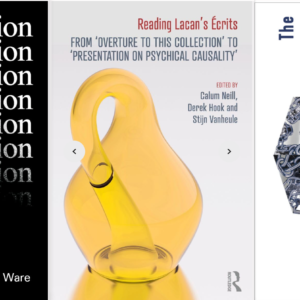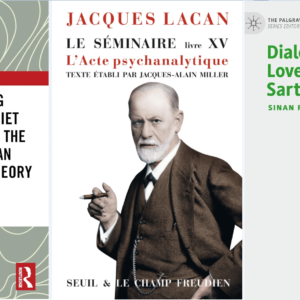News – March 2021
Want to receive this news via email each month? Sign up here.
20% off and free global shipping on all Routledge titles for LacanOnline.com readers. Use this link and code S031 at the checkout.
Beginning with the latest new books in the Lacanian literature out now and announced for later in the year – a translation of The Baby and the Drive: Lacanian Work with Newborns and Infants by Marie Couvert was released in the last month, the latest from the Centre for Freudian Analysis and Research Library. Citing the drive as the crucial factor in the development of the child, Couvert undertakes a re-reading of drive theory, presenting it as a force characterised by four drive fields established in early infancy. Difficulties in the access or activation of the drives are examined for how they may cause difficulties for newborns and infants, with Couvert going on to discuss possible resolutions and treatments. The book is translated from the French original by Lindsay Watson.
Eroticizing Aesthetics: In the Real with Bataille and Lacan by Tim Themi will be published in June. Bringing together these two thinkers with Nietzsche, the book looks at the function of the erotic and its expression through aesthetics. From Bataille’s examination of the history of aesthetics, Themi argues that Nietzsche’s critique of Christian-Platonic dualism and Lacan’s critique of the ‘Good’ in the Ecrits and Seminar VII share a close connection, allowing for the possibility of “a new ethical criterion for aesthetic works and creations” as a result.
David S. Marriott’s Lacan Noir: Lacan and Afro-pessimism has been announced for release in July, courtesy of The Palgrave Lacan Series. Marriott explores Lacan’s influence on Black Studies from the 1950s onwards, and how it in turn challenged Lacanian readings of race. Proposing a reassessment of the notion of race from a Lacanian perspective – and separating it from language, culture, religion, and identity – Marriott argues for the reassessment of the links between psychoanalysis and the “three main domains of black inquiry: mastery, knowledge, and embodiment”, as part of a re-examination of the link between capitalism, colonialism, and anti-blackness. The place of Lacan in Fanon Studies and Afro-pessimism is reconsidered, in what promises to be a timely and original contribution to the field.
September will see the release of Lacanian Psychoanalysis in Practice: Insights from Fourteen Psychoanalysts, edited by Diego Busiol. A clinically-focussed text, 14 Lacanian psychoanalysts from Italy and France give accounts of how they listen to clinical questions and work with them in-session. Psychoanalytic listening provides the collection’s red thread – what is it an analyst listens to or for? How, when, or should they intervene? – and chapters range across ‘classical’ diagnostic categories such as hysteria, obsession, and paranoia; to more recent issues encompassed by descriptions such as panic disorder, binge-eating, and borderline. This volume promises to be a rich collection of insights into the practical work of Lacanian analysts across different associations and groups in the analytic community.
Berjanet Jazani’s Lacan, Mortality, Life and Language: Clinical and Cultural Explorations has been announced for release in September. Following her Lacanian Psychoanalysis from Clinic to Culture which was published last December, this work blends autobiography with theoretical and clinical reflections on subjectivity, the symptom, and the body. The question of what makes us human – as speaking beings, as psychoanalytic subjects, as affect-laden, feeling beings – is the book’s common concern, uniting clinical and cultural references spanning from ancient Persia to London’s Theatreland.
The Freudian School of Melbourne will publish a collection of its members’ writings, and those of the Belgian psychoanalyst Christian Fierens, in September under the title Lacan and Other Heresies: Lacanian Psychoanalytic Writings. Published by Routledge, its chapters will tackle issues such as the psychoanalysis of children, the writings of Sabina Spielrein, and the intersection of creativity and the arts.
Coming later in the year from the Palgrave Lacan Series will be Bret Fimiani’s Psychosis and Extreme States: An Ethic for Treatment. Presenting a theory of transference-in-psychosis that aims to provoke a change in its understanding, Fimiani argues that “the aim of the psychoanalytic experience is the creation of a new ethic for the analysand.” Drawing upon Lacan’s work and those of his successors – such as Deleuze & Guattari and Apollon – the book synthesises clinical and ‘peer model’ principles in an attempt to navigate through the transferential impasses Fimiani sees encountered in practice.
Turning to events, Das Unbehagen is organising two events in April exploring ambivalence. The first, ‘Psychoanalysing Ambivalence’, will take place April 15th with Carol Owens and Stephanie Swales, alongside discussants Patricia Gherovici and David Lichtenstein. The second, ‘Reading Ambivalence’, on April 26th will be with Judith Butler, Marcus Coelen, and Jamieson Webster. The events are free with registration via the links above.
On 22nd April Lacan In Scotland will host an online seminar with Dr Lorenzo Chiesa discussing religion from a Freudian and Lacanian perspective, charting Lacan’s change in attitude towards Freud’s writings on religion, and Lacan’s own comments on theological matters. The event is open to all and free via Zoom with Eventbrite registration.
The Lacan Circle of Australia has launched its calendar of events from April-December 2021. Among them:
- The Lacan Circle Reading Group on Jacques Lacan’s Seminar III: The Psychoses continues every week. Open to anyone with an interest and entirely on Zoom. Wednesdays 7:00pm.
- The Lacan Circle Cartel Presentation Days will be held over two Saturdays in May. Hear from cartelisands on transference, interpretation, transgender, perversion and Lacan’s Seminars XX and XXIV. Free and open to all on Zoom. May 8 and 15.
- The Lacan Circle Winter Webinar is four seminars over four Saturdays in June. Serena Smith presents Bodily Cuts, Rims and Scraps: Lacan’s Topology. Free and open to all on Zoom.
- The Lacan Circle Journal PsychoanalysisLacan is calling for papers for Volume V. Submissions on a range of topics that make an important contribution to the field of Lacanian psychoanalysis are welcome.
CFAR has also announced its Public Seminar programme from the Summer Term 2021. All seminars will be held via Zoom. Starting 17th April with a roundtable on ‘Resolving Transference’, the schedule will culminate on Saturday 3rd July with the CFAR Annual Conference, this year on ‘Psychoanalysis and the Pandemic’.
From past events, Nestor Braunstein discusses his new book, Jouissance: A Lacanian Concept in a symposium hosted by Fernando Castrillon, now available on YouTube courtesy of the European Journal of Psychoanalysis. Recorded in March, discussants over the two and a half-hour session are Braunstein’s translator Silvia Rosman and Dr Ian Parker. Read and support the European Journal of Psychoanalysis here.
Lastly, 11th April is the deadline to register at the reduced rates for the 2021 NLS Congress on ‘Bodily Effects of Language’. The conference runs 22nd-23rd May and is entirely on Zoom. Check out brief commentaries in advance of the Congress itself on the event’s blog.
Got news? Get in touch.




Leave a Reply